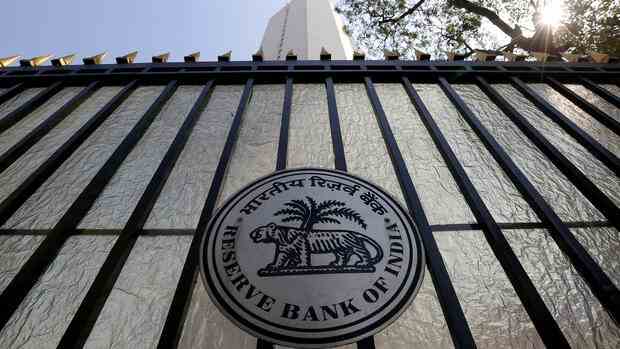Bangkok A year of uncertainty begins for European banks in India. As early as May, massive additional hurdles for your business in the Asian growth market threaten. The background is a conflict between the European Union and the Indian regulatory authorities. With a view to Indian transactions, the European securities regulator Esma wants greater supervisory and auditing powers – which New Delhi vehemently rejects.
As a result of the dispute, the EU will no longer recognize six major Indian clearing houses from April 30th. The surprising announcement came a few weeks before the turn of the year and has raised concerns among European financial institutions that doing business in Asia’s third-largest economy could become significantly more difficult and expensive in the future.
So far, there are no signs of an agreement between the EU and India. A few days ago, the Indian central bank RBI clearly opposed the demands from Europe. The move would give a foreign regulator “extra-territorial reach,” RBI complained in its semi-annual report on financial market stability. The EU’s wishes show “a lack of confidence” in the abilities of local regulators, it said.
Among the victims of the dispute are the Deutsche Bank and the French financial institutions BNP Paribas and Société Générale. If the conflict is not resolved, they face significantly higher capital requirements for risk positions in India vis-à-vis the central clearing houses (CCP), which will no longer be recognized by the EU. CCPs act between the seller and buyer of a financial product and serve to reduce the risk of default.
Top jobs of the day
Find the best jobs now and
be notified by email.
Representatives of financial groups hope for an agreement
When recognizing clearing houses from countries outside the EU, the European securities regulator requires cooperation agreements with the competent authorities of third countries. In these, these authorities should guarantee the Europeans, among other things, extensive rights to information.
lucrative market
460
Million Euros
The India business in 2022 alone brought earnings before taxes to Deutsche Bank.
According to information from November, Esma has so far come to an agreement with 19 states. India sees the regulations as an unacceptable interference. The fundamental conflict revolves around “that an Indian company that does not operate in the European Union, but only in India, is subject to regulation by an EU regulator,” said India’s deputy central bank governor T. Rabi Sankar.
>> Read here: Supervision refrains from stricter monitoring of Deutsche Börse
Esma said it would continue negotiations with the Indian authorities. A “maximum of flexibility” will be shown in order to reach an agreement. If this does not succeed, however, the authorities believe that it is clear that European banks will have to reckon with higher capital adequacy requirements in India.
Representatives of European financial groups, who do not wish to be named, continue to hope that an agreement can be reached in the short term. It is also possible that the EU will postpone the planned withdrawal of recognition for the Indian clearing houses, giving more time to find a compromise.
Capital costs could increase significantly
Observers expect that the competitiveness of European banks in the Indian business will decrease if they actually have to meet higher capital requirements. The cost of capital could increase more than 12 times, the Reuters news agency reported, citing a European bank manager. Deutsche Bank declined to comment on an inquiry about the potential impact. According to last year’s annual report, India was the bank’s most profitable market in the Asia-Pacific region, with a contribution to earnings before taxes of around EUR 460 million.
The Indian banking sector was a clear outperformer in 2022. Anand Dama, analyst at Indian financial services firm Emkay Global
In India there is growing concern that the consequences of the dispute could also be felt outside of the European banks. For example, one of the clearing houses that will no longer be recognized in the future operates the trading platform for Indian government bonds. “Should non-recognition come into force, the trading business of European banks would be severely restricted, which in turn could lead to a decline in volumes in the Indian government bond market,” analyzed the business daily Business Standard earlier this year.
The conflict is escalating at a time when the financial sector in India is actually presenting itself as a beacon of hope in a difficult environment. “The Indian economy is facing strong global headwinds,” the central bank’s Financial Stability Report said. However, solid macroeconomic fundamentals and healthy financial sector balance sheets made the subcontinent appear resilient.
The bad loans that weighed heavily on the emerging market’s financial sector for years are now hardly a problem. Their share of total lending has fallen to its lowest level in seven years. “The results of the stress test show that banks are well capitalized and able to absorb macroeconomic shocks,” the central bankers’ report said.
Bank profits have also made a big leap recently: In the third quarter, the industry recorded almost 60 percent higher profits than in the previous year. “India’s banking sector was a clear outperformer in 2022, driven by stronger-than-expected credit growth after years of slack and a sharp rise in margins on the back of higher interest rates,” commented Anand Dama, analyst at Indian financial services firm Emkay Global.
Dama expects the strong growth in lending to continue. India’s good economy should also ensure this: Economic growth of around seven percent is expected for this year – more than in any other major economy.
More: India wants to take advantage of China’s weakness – but still has a lot of catching up to do
